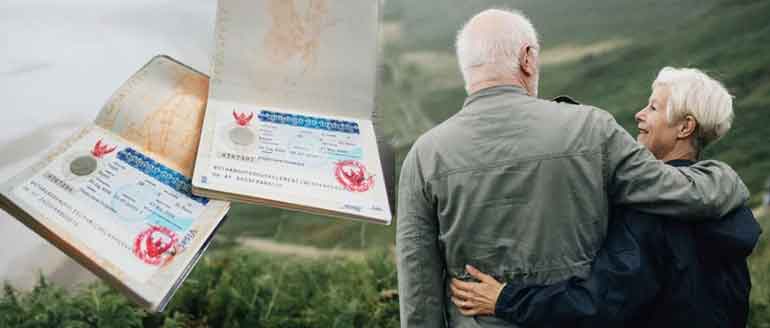 Elderly expats in Thailand dazed and confused over new requirements for insurance, ‘retirement visas’ and COVID
Elderly expats in Thailand dazed and confused over new requirements for insurance, ‘retirement visas’ and COVID
A new policy concerning insurance for so called ‘retirement visas’, as well as the requirements needed for anyone entering Thailand have sparked concern, confusion and even panic amongst elderly expats.
A recent article by the Pattaya Mail revealed how some older expats now felt “trapped” in Thailand due to new rules recently rolled out by the Ministry of Foreign Affairs.
The new rules which are in accordance with the Thailand Pass system, launched on November 1, state that foreigners who enter Thailand need to provide health insurance with a minimum treatment coverage of 50,000 USD or equivalent in any other currencies.
The concerns raised by the expats who spoke to the Pattaya Mail are that if they were to leave Thailand and visit their home country, they would have difficulty meeting the insurance requirements needed for them to re-enter the country.
The concern mainly comes from elderly expats who due to their age or having pre-existing health conditions means that obtaining insurance is at best expensive or at worst impossible.
For others, they simply can not afford to purchase the insurance one currently needs to visit Thailand.
Pattaya Mail’s article raises some valid points, particularly for elderly expats who wish to return home to visit friends and relatives, which for many has not been possible for almost two years.
However, a short time after the article was published online, a thread started on ASEAN NOW, the comments of which highlighted the confusion among some expats regarding a number of issues related to insurance for so-called ‘retirement visas’ and the current requirements for people wishing to enter Thailand.
Non-Immigrant “O-A” visa vs Non Immigrant O extension
The confusion is predominantly caused by a separate change to the policy for anyone wishing to apply for a Non-Immigrant “O-A” visa.
Non-Immigrant “O-A” visas are available to people aged over 50 who wish to stay in Thailand for 1 year.
Since October 1, applicants are required to have health insurance which offers minimum coverage up to 3 million baht for inpatient care.
However, it is important to note that this requirement only applies to O-A visas.
Most expats in Thailand will have a Non Immigrant O extension, which is normally based on ‘retirement’, which is granted to those aged over 50.
One of the main differences between an O-A visa and Non-Imm O extension is that Non Immigrant O extensions are obtained from an immigration office within Thailand.
A Non-Immigrant “O-A” Visa is obtained by applying at a Thai embassy or consulate overseas.
However, confusion occurs as both the Non Immigrant O and Non-Immigrant “O-A” are often and incorrectly referred to as ‘retirement visas’ – which is used as a kind of catch-all term for both, by everyone from expats to immigration officials themselves.
But when a change in policy specifically applies to one and not the other it is important that people understand the differences between the two.
There is currently no requirement for anyone on a Non Immigrant O extension to have health insurance – apart from if they wish to re-enter Thailand, which is a requirement for all foreigners, regardless of their visa status.
However, those with a work permit can show a valid social security card or certified letter from their employer.
Whether the requirement will be introduced at some point in the future is impossible to say and any mention of such is pure speculation at this stage.
Thailand Pass and insurance
What is also not known is how long the Thailand Pass system – and consequently – the mandatory insurance for foreigners entering Thailand will be required.
While the Thai authorities have previously revealed the issue that unpaid medical bills from uninsured foreign tourists have on the Thai health care system (and state coffers), if the current insurance requirement was to be implemented long term it could potentially put off millions of foereign tourists from visiting Thailand altogether.
Source: aseannow.com



